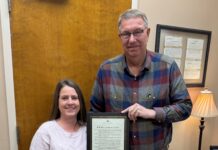CULLMAN – “During elementary school I always played sports, but remained the fat kid. During middle school I continued to play sports and have semi-monitored meal plans, and continued to gain weight. As high school approached I spent 4-5 days a week at the gym with a girlfriend from high school; she would lose weight and I would remain the same. This type of no-progress is discouraging. After high school I attempted other gym schedules, Curves, Weight Watchers, CrossFit and other means of weight-loss accountability. I would lose 10 pounds and gain 20 pounds, lose 25 pounds and gain 35 pounds. It seemed that my body wanted to be heavy.”
Those are the words of Emily, a local young woman in her mid-20s who has battled her unhealthy relationship with food for many years. Her words ring true with many people who share similar stories with their food fixations.
Addiction to food runs the spectrum from morbid obesity to anorexia nervosa to binge-eating disorder, with each having serious health implications and potentially fatal results. Food addiction involves the feel-good chemical in the brain, dopamine, as does drug addiction. Same results with a different drug of choice, per se.
“I was the only child of a divorced home, and although there were no known food addictions, there were substance addictions. I learned to use food as a coping skill. This is part of southern culture- food for everything. If you are happy, you celebrate with food. When you are sad, you mourn with food. Food was good and if one bite was good then 10 bites would be better. It is no different than a drug addiction.
“Sometimes the process of moderation does not work: this makes food addiction a little more difficult to diagnose or understand, because you do need food to survive.”
Food addiction is often more difficult to treat than a drug addiction. Drug addiction is effectively treated with abstinence programs whereas the same cannot be done with food.
614,348 Americans lost their lives to heart disease in 2014, the leading cause of death in the country, according to the Centers for Disease Control and Prevention (CDC). Contributing risk factors that are within one’s control in heart disease include physical inactivity, obesity and poor diet. Food addictions including anorexia nervosa, bulimia nervosa and the rapid weight losses and gains which can go hand in hand with binge eating all lead to increased odds of developing heart disease.
Heart disease is the cause of one in four of the deaths in the United States, surpassing heroin overdoses and all other drug-related deaths. Approximately 1.5 million heart attacks and strokes are suffered by Americans each year, costing over $320 billion annually in healthcare costs.
Emily was fortunate and has not suffered any serious health complications as a result of her food addiction.
“I have been incredibly blessed that I do not have any health or medical issues related to food addiction and obesity. My cholesterol has always been below average. My blood pressure has never run high. And, if anything, my blood sugar gets low. Most of my physicians are always a little surprised that the fat girl is actually healthy, minus the obesity itself.
“I was incredibly blessed to have gastric sleeve surgery (weight loss surgery) last year. Going through that process and the psychological testing and follow-ups that are included have helped me to learn that food is fuel and should not be abused.
“I have learned new coping skills. If I want to celebrate I may have a coffee with friends or maybe buy a new book. If I am having a bad day, I work out harder; I stay on the elliptical longer and use a higher setting. I do want to take care of my body and no longer abuse it. I am also not afraid to ask someone to hold me accountable or ask for prayers for will power.
“I believe that one of the reasons it took me so long (I was 26 years old when I realized that my food addiction was real) to see the problem was because my family and close friends have always been incredibly supportive of me. I have been blessed to have not been bullied for my obesity. I have always felt loved, I always felt good enough. I was raised to be invincible.”
44-year-old Ryan has a family history of obesity, heart disease, strokes and he is no exception to the rule. His weight battle began 10 years ago and is still going on to this day.
“Even though my doctor has told me to lose weight because of my high blood pressure and high cholesterol and I really want to, I still go through the fast food drive-thrus a couple of times a week. I like fruits and vegetables, but I never eat them because junk food like pizza tastes better. I know it’s short sighted but it’s easier just to be fat. I know that sounds bad, but when you boil it down, that’s the truth. I wish it wasn’t. I don’t want to die because I’m too lazy to cook and eat something healthy, but that’s where I’m headed.”
Contact your physician before beginning a weight loss journey. She or he will be able to advise you on exercise options and nutritional goals.
Cullman Regional Medical Center’s Nutrition and Wellness Services are available to evaluate and treat people with various nutritional needs and provide guidance and education to help meet individual goals. They can be reached at 256-737-2139. More information is available at https://www.crmchospital.com/our_services/all_services/nutrition_wellness_services.aspx.
Local support is also available in the Cullman area through Overeaters Anonymous, a group that meets at Grace Episcopal Church on Mondays at 9:30 a.m. The church is located at 305 Arnold St. in Cullman. More information on the meetings can be found by calling Darlene at 256-352-1143 or on the web at www.oa.org where free online assessments are available along with free online or telephone meetings.
Part 4: http://cullmansense.com/articles/2016/06/11/addiction-christ-centered-recovery-part-4
Part 3: http://cullmansense.com/articles/2016/06/05/addiction-luckiest-guy-i-know-part-3
Part 2: http://cullmansense.com/articles/2016/05/29/addiction-game-changer-part-2
Part 1: http://cullmansense.com/articles/2016/05/22/addiction-family-affair-part-1




























